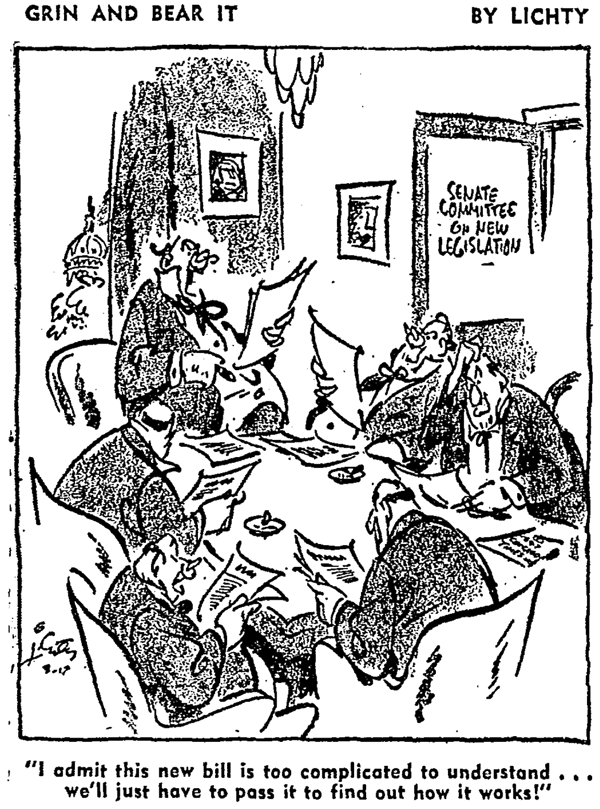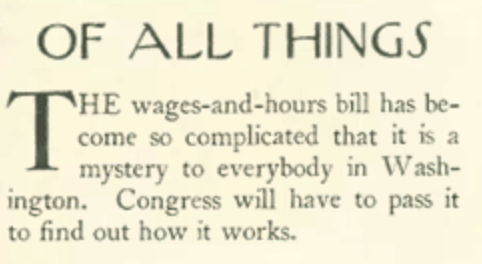We'll just have to pass it…
« previous post | next post »
In the majority opinion of King v. Burwell, Chief Justice Roberts had some harsh words for the "inartful drafting" of the Affordable Care Act, which led to the difficulty in interpreting the phrase "an Exchange established by the State." Roberts wrote:
The Affordable Care Act contains more than a few examples of inartful drafting. (To cite just one, the Act creates three separate Section 1563s. See 124 Stat. 270, 911, 912.) Several features of the Act's passage contributed to that unfortunate reality. Congress wrote key parts of the Act behind closed doors, rather than through "the traditional legislative process." Cannan, A Legislative History of the Affordable Care Act: How Legislative Procedure Shapes Legislative History, 105 L. Lib. J. 131, 163 (2013). And Congress passed much of the Act using a complicated budgetary procedure known as "reconciliation," which limited opportunities for debate and amendment, and bypassed the Senate's normal 60-vote filibuster requirement. Id., at 159–167. As a result, the Act does not reflect the type of care and deliberation that one might expect of such significant legislation. Cf. Frankfurter, Some Reflections on the Reading of Statutes, 47 Colum. L. Rev. 527, 545 (1947) (describing a cartoon "in which a senator tells his colleagues 'I admit this new bill is too complicated to understand. We'll just have to pass it to find out what it means.'").
In a 2010 post on the blog The Periwig Squiggle. §§§, Tobias A. Dorsey presented some research on Felix Frankfurter's cartoon citation of 1947. Here is the full context:
Loose judicial reading makes for loose legislative writing. It encourages the practice illustrated in a recent cartoon in which a senator tells his colleagues "I admit this new bill is too complicated to understand. We'll just have to pass it to find out what it means."
—Felix Frankfurter, "Some Reflections on the Reading of Statutes," 47 Columbia Law Review 527, 545 (1947)
As it happens, Justice Frankfurter slightly misquoted the "recent cartoon" in question, which was an installment of George Lichty's "Grin and Bear It" series. Dorsey located the cartoon on Google Books, as it appeared in the Apr. 4, 1947 issue of The Railway Gazette. Google has that in snippet view, so you can't see the whole thing, but I managed to find the same cartoon in the Mar. 12, 1947 issue of the Los Angeles Times:
The caption reads, "I admit this new bill is too complicated to understand… we'll just have to pass it to find out how it works!" But in Frankfurter's version, "how it works" has been changed to "what it means."
It turns out that Lichty wasn't being very original in his caption. I found the same joke appearing in the Aug. 14, 1937 issue of The New Yorker under the heading "Of All Things." The anonymous New Yorker scribe wrote: "The wages-and-hours bill has become so complicated that it is a mystery to everybody in Washington. Congress will have to pass it to find out how it works."
So it was "how it works" in 1937 in The New Yorker and again in 1947 when Lichty lifted the joke, but "what it means" when Justice Frankfurter cited it. Of course, the "what it means" version is more germane in cases where the Supreme Court is interpreting the meaning of statutory language. But it's a tad ironic that the "original intent" of the joke got warped along the way.


J. W. Brewer said,
June 25, 2015 @ 3:19 pm
I have learned by experience while practicing law that it can often be hazardous to rely on a quotation from decision A in later decision B to know what decision A really said, because the quote may have been taken out of context or simply be inaccurate as to the exact words (although it is easy to misquote non-maliciously without getting the gist of the passage wrong, as with copyist errors in medieval MSS). Of course, the incremental effort required to find decision A itself and read it directly (especially now that we lawyers usually just pull up old decisions on our screens rather than pull hard-copy volumes off of shelves) is usually not that great compared to what would be required if decision B referenced something from the funny pages without citation to a particular publication and particular issue.
Bloix said,
June 25, 2015 @ 8:43 pm
It is shocking to read Justice Roberts refer to the filibuster as "the Senate's normal 60-vote filibuster requirement." There is nothing "normal" about the modern evolution of the filibuster from a rarity to a daily event.
D.O. said,
June 25, 2015 @ 10:53 pm
"But we have to pass the bill so that you can find out what is in it, away from the fog of the controversy."
Sid Smith said,
June 26, 2015 @ 7:08 am
As an inhabitant of [insert name of any other first-world country] I'm very very happy for Americans. Soon, I hope, you'll never have to spend a single moment thinking about how to get healthcare and/or how to pay for it.
KevinM said,
June 26, 2015 @ 2:11 pm
As D.O. was implying, Chief Justice Roberts was no doubt indirectly invoking a comment (also widely misquoted) by Nancy Pelosi in 2010.
http://www.mediaite.com/tv/the-context-behind-nancy-pelosis-famous-we-have-to-pass-the-bill-quote/
Ben Zimmer said,
June 27, 2015 @ 12:59 pm
The Pelosi version is also what inspired Tobias Dorsey to research the source of the Frankfurter quote for his 2010 post.
chris said,
June 29, 2015 @ 8:13 pm
Sid, I think you are celebrating prematurely. But this isn't Politics Log, so I probably shouldn't elaborate on either your point or Bloix's.
Is this thread intentionally related to the nearby thread about "just", or is that just a coincidence?